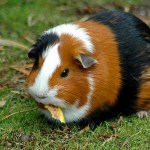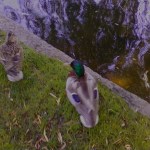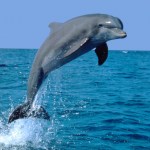
The 24th installment of the Carnival of Evolution is up at NeuroDojo, and this month features an extra helping of brain!
As usual, I submitted a few pieces. With respect to evolution more generally, you can find my piece on oral sex in fruit bats:
Speaking of scandals, a paper on oral sex in fruit bats was at the center of a personal dispute that got called, inevitably, fruitbatgate. Regardless of your opinions on that matter, the science is definitely worth looking at, which Jason does at The Thoughtful Animal. (And not in a pervy way.)
And since the special theme of the carnival this month…
Here are my ResearchBlogging Editor's Selections for this week:
I was away at the annual conference of the Association for Psychological Science this week. Luckily, others were able to supply the sci-blogosphere with plenty of psychology and neuroscience blogging.
There's a saying that clothes don't make the man, but a lot of times the clothes we wear (accessories and tattoos included) do at least say something about who we are. Daniel Hawes tells us how wearing fake imitations of real products affects behavior.
Could Parkinson's Disease be a learning disorder? The blog Science Life reviews…
It should not come as a surprise to the regular reader of this blog that a lot can be learned about animal cognition by simply observing animal behavior. But can observing animal behavior lead the observer to make inferences about brain anatomy? Can observing animal behavior tell us something about the evolution of the brain?
Figure 1: Like the raccoon says.
Let's say you have two very very closely related species. You might even call them congeneric, because they are from the same taxonomic genus. In most ways, these two species are very similar, but they differ behaviorally in some very big…
Two songs by Israeli singer Maya Avraham.
Lama (Why?) ××× - official music video
Tirkedi (Dance) תרק××
Zen recently wrote mentioned this study on his blog, so I thought it was time to dredge it out of the archives. Also, I've just returned from APS (see my daily recaps here here and here), and I am TIRED.
Domestic animals and their wild counterparts can be different in big ways; there can be differences in morphology (physical characteristics), physiology, and behavior. These changes may depend on spontaneous adaptations to captivity or to artificial selection pressures arising from the motivation for domesticating the animal in the first place.
One change that is often observed as a result of…
I am exhausted. Today was a very long conference filled day followed by a very long baseball game at Fenway Park. My labmate, who is a bit of a baseball freak, in a moment of sheer brilliance, bought us STANDING ROOM ONLY tickets for the game. And so we stood. For >3 hours. My feet hurt. At least the Red Sox won. Plus it was pretty cool to see Fenway Park.
Figure 1: The view from our standing-room only area.
So here's the tweet rundown from today. I think everything is pretty self-explanatory, so I'll go easy on the commentary. Also, have I mentioned I'm tired?
We'll start with the end…
At some point today, I got a whole mess of new twitter followers who (I hope) are coming to check out the blog. Here are a few links to some of the best and most popular posts, to give a sense of the things I like to write about.
Here is a quick introduction.
Here are a few of the most popular posts:Whale SnotWhale PoopDoes Oral Sex Confer An Evolutionary Advantage? Evidence From BatsYour Kid's Newest Art Critic
And a few of my personal favorites:Giant Birds and Terrified MonkeysElephants Say "Bee-ware!"Are Those Dogs Playing or Fighting?
And a favorite from the old blog, that I haven't…
Another awesome day of psychologically scientific hilarity and awesomeness.
The day started for me with a session entitled "Teaching Applied Cognitive Science," given by Roberta L. Klatzky. Fascinating to learn some of the ways that cognitive science gets applied in the real world (some things were even new to me), and also some of the best ways to incorporate these real-world applications into classroom curricula.
I tweeted one thought derived from the session:
Teaching: Disconnect btw apps of psych according to students, profs, and curricula. Should focus on concrete, not just "relevant…
Today was the first full day of APS in Boston. Well, sort of. The main APS program began this evening, but starting last night and continuing through the rest of today was the pre-conference APS-STP (Society for the Teaching of Psychology) Teaching Institute, which I attended, and during which I presented a poster.
Here's a review and recap for the conference thus far.
Last night there were only two concurrent sessions, I went to a session on teaching about the chemical senses presented by Debra Zellner and Scott Parker. Demos abound for teaching about visual and auditory sensation and…
The fantastic blog 3 Quarks Daily has opened up nominations for its second annual prize in science blogging. This year, the contest will be judged by the great Richard Dawkins, and there will be three winners.
Posts can be nominated by bloggers or readers, and if any of you wanted to nominate one of my posts I would be grateful. Or, of course, nominate any other!
Here are the relevant details:
Please nominate your favorite science blog entry by placing the URL for the blog post (the permalink) in the comments section of this post. You may also add a brief comment describing the entry and…
Some kids more readily recognize Ronald McDonald than the President of the United States of America. Sad, right?
Check out this exchange, from the 2004 movie Super Size Me:
Morgan Spurlock: [to kids] I'm gonna show you some pictures and I want you to tell me who they are.Children: OK.
Morgan Spurlock: [Showing a picture of George Washington] Who's that?Child: George Washington?
Morgan Spurlock: Good. Who was he?Children: He was the 4th president. He freed the slaves. He could never tell a lie.
Morgan Spurlock: [Shows picture that you can't see] Who's that?Child: George W. Bush?
Morgan…
I have a confession to make. I would wear a pair of jeans any day over something more formal. I just find it more comfortable, and I maintain that you can look just as good in the right pair of jeans as in a pair of, for example, black slacks. As a result, I often try to justify the wearing of jeans in times that, if really pressed, I would probably admit it wasn't entirely appropriate or proper. But then again, jeans can be nice. Jeans can be professional-looking. Obviously I wouldn't wear jeans during the days of a conference in which I'm presenting my work - but what about the other days?…
So who is going to be at APS this week in Boston?
I'll be there for both the pre-conference teaching institute as well as the main conference.
Find me presenting a poster during the teaching institute:
Teaching Institute Poster Session - Board: TI-054
Location: Back Bay Ballroom
Date/Time: Thursday, May 27, 2010 11:30 AM - 12:30 PM
And during the main conference:
Poster Session XII - Board: XII-027
Location: Grand Ballroom
Date/Time: Sunday, May 30, 2010 10:30 AM - 11:30 AM
I will also be attending the workshop on scientific writing on Thursday afternoon, the Psi Chi Distinguished…
The perspective that whales, dolphins, and other such marine mammals should be afforded "human rights" has surfaced again.
I thought I'd revisit a post I wrote about this several months ago, from the archives, when this first hit the news after the AAAS conference in San Diego. So here's a modified, updated version of the original post.
The blogosphere is all a-twitter with talk of the recent commentary in Science that dolphins should be considered people. Well, sort of people. Non-human people.
On the heels of the incident at SeaWorld in Florida in which a trainer was killed by one of the…
Want to get experience working with marine mammals? The Dolphin Research Center, in Grassy Key, Florida, is looking for interns for the Fall semester, and the deadline to apply is next week!
The DRC is home to a pod of Atlantic bottlenose dolphins (you might recognize A.J. from my banner image, used with permission of course) and a group of California sea lions. While the DRC hasn't yet been hit by oil from the BP oil spill, they are monitoring the situation closely - this may be a great opportunity to learn a ton about marine mammal research and help in the conservation effort.
Check out…
Found this in my inbox the other day. Looks like a cool workshop and a really rich dataset. And the great part is if they accept your application, it is all entirely funded!
The National Center for Education Statistics (NCES) is sponsoring a three-day advanced studies seminar on the use of the Early Childhood Longitudinal Study, Kindergarten Class of 1998-99 (ECLS-K) database July 14-16, 2010. The ECLS-K allows researchers to examine the relationships among a wide range of child, family, teacher, classroom, and school variables and children's development and performance in elementary and…
More science, more blogging, more fantastic. Here are my Research Blogging Editor's Selections this week:
Angry people might play video games to release pent up energy and aggression...But researchers find that it doesn't really help. Neoacademic explains why.
Blue bananas and pink elephants. Kevin Mitchell at Wiring the Brain considers a rare condition called colour agnosia.
Stereotypically, men don't love housework, but most at least begrudingly help out. New research finds that men who do less paid work than their female partners also do less housework than average men. Read about why on…
Four sea lions nicknamed Matti, Pablo, Apolo and Taite were recently found underweight and malnourished on beaches in Orange County. This morning, they were released back into the wild before a cheering crowd at Crescent Bay in Laguna Beach. This was possible due the incredible work of the Pacific Marine Mammal Center, a non-profit organization dedicated to the rescue, rehabilitation, and release of marine mammals stranded along the Orange County coastline.
And check out how positively THRILLED the animals seem to be to get back into the water. Let's hope they re-adjust to life at sea…
Lately, a paper to be published in the June edition of the American Naturalist has been getting some attention. The findings that are getting reported out of this paper didn't make sense to me, but I wondered if this was an issue with accuracy in reporting. So I went and found the paper. Turns out that the reporting is accurate, its the actual findings from the paper that confuse me. I really wanted to make sense of this paper, so I've been waiting a while to blog about it. But I can't make sense of one key finding.
Figure 1: An artist's rendition of me, being confused. If, you know, I were…
Figure 1: So what did everyone think of the Fringe season finale last night? I'll tell you what I thought: J.J. Abrams can bite me. (image source)
Okay, so maybe part of the reason I am so annoyed is because I'm kind of obsessed with Anna Torv's character, and I'm pissed about that twist at the end. Damn. Anyway, here's this week's round-up.
Did you catch my Research Blogging Editor's Selections for this week? Here's a link.
Another reminder: we're relaunching Ask A Scienceblogger. Have any burning questions about science? Do you stay awake at night wondering about something? Ask us. There's…








